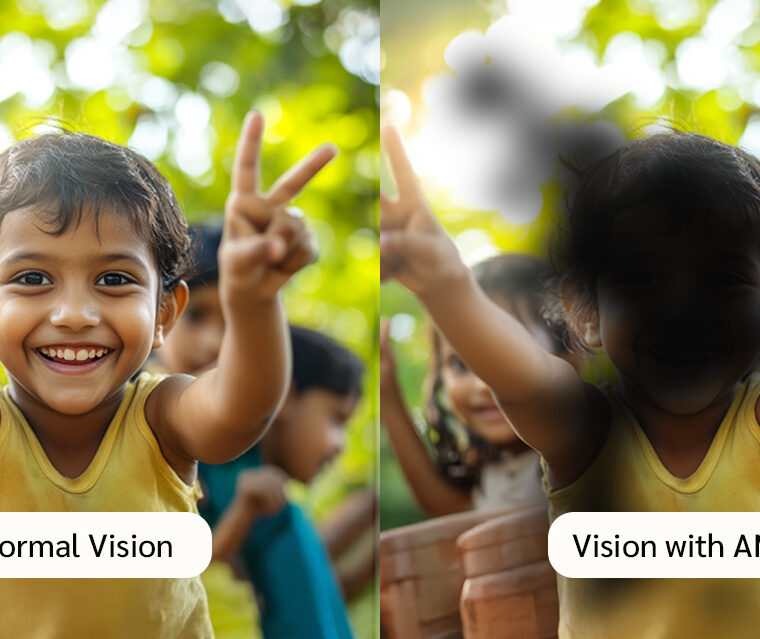What is AMD?
Age-related macular degeneration (AMD) is an eye disease that can blur your central vision. It happens when aging causes damage to the macula — the part of the eye that controls sharp, straight-ahead vision.
AMD is a prevalent condition and a major cause of vision loss in older adults. While it doesn’t lead to complete blindness, it can significantly impair your central vision, making it difficult to see faces, read, drive, or perform close-up tasks like cooking or household repairs.
The progression of AMD varies among individuals; for some, it develops very slowly, while for others, it advances more quickly. Early AMD may not present noticeable vision loss right away, which is why regular eye exams are crucial for detecting the condition.
Early Symptoms of AMD
- Blurry or Wavy Vision: Difficulty seeing fine details, especially when reading or recognizing faces.
- Distorted Vision: Straight lines may appear wavy or bent, which can affect the perception of objects.
- Difficulty Seeing in Low Light: Problems with vision in dimly lit environments or at night.
Symptoms of Dry AMD
- Gradual Vision Loss: Slow and progressive loss of central vision, which may not be noticeable at first.
- Difficulty with Visual Tasks: Challenges in performing tasks that require sharp central vision, like reading or driving.
Symptoms of Wet AMD
- Rapid Vision Loss: A sudden decrease in central vision, often occurring within days or weeks.
- New or Increasing Blind Spots: Dark or empty areas in the central vision.
- Distorted or Blurry Vision: Significant distortion in the appearance of objects or their size.
Common Symptoms in Advanced AMD
- Severe Central Vision Loss: Significant impairment or loss of the ability to see objects directly in the line of sight.
- Complete Blind Spots: Large areas of missing vision in the central field, making it difficult to recognize faces or read text.
Are There Treatments for Age Related Macular Degeneration?
At this time, there is no cure for this eye condition. However, there are ways to slow down its progression, as well as healthy living choices which can make a difference in the speed of the progression of the condition.
Healthy lifestyle:
Avoid smoking, exercise regularly, keep blood pressure and cholesterol well controlled, prevent exposure to UV light, eat a well-balanced diet filled with leafy greens, fish, and avoiding processed foods. All lifestyle and diet changes should be discussed with your doctor prior to the modifications.
Supplements:
A large study, Age Related Eye Disease Study (AREDS and AREDS II), found that a combination of vitamins and minerals (lutein, zeaxanthin, zinc, copper and vitamins C and E) can slow down the progression of Dry AMD in SOME patients; ask your doctor if an AREDS-type supplement might be worthwhile for you.
Injections:
Injecting anti-vascular endothelial growth factor (anti-VEGF) drugs directly into the eye is a common treatment to treat wet AMD. These injections slow down the development of new blood vessels in the retina, thereby reducing further scarring and loss of vision.
Lasers:
Lasers are occasionally used to treat wet AMD to destroy the new, rogue blood vessels, to stop the leakage into the retina.



